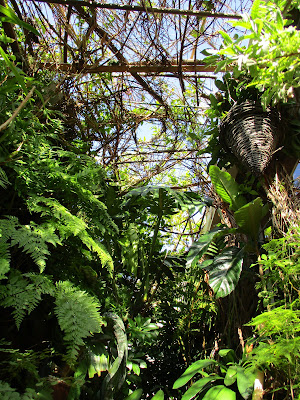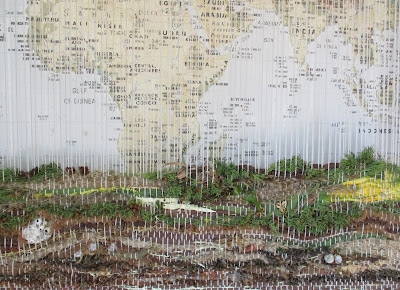"Because digital minimalists spend so much less time connected than their peers, its easy to think of their lifestyles as extreme, but the minimalists would argue that this perception is backward: what's extreme is how much time everyone else spends staring at their screens." Cal Newport (2020). Digital Minimalism: Choosing a Focused Life in a Noisy World. Photo by Monica Pinheiro free to use if you respect the license CC BY-NC-SA ( CC ).

"More than conversation at the interface, it is creative assemblages like these that explore and elaborate the particular dynamic capacities that digital media afford and the ways that through them humans and machines can perform interesting new effects (...) in uniquely particular ways." Lucy Suchman (2009). Human-machine reconfigurations: plans and situated actions.
Sep 23, 2022
September
Aug 29, 2022
August
Jul 18, 2022
The last layer
July
Jul 15, 2022
A Day Later set
Jorge Queiroz (2020). A Day Later 1, 2, 3, 4 e 5 (not in this order). Exposição «to go to», Calouste Gulbenkian.
Jul 14, 2022
February
July
Jun 21, 2022
June
"Craft makes us human, and in doing so, it can provide deep satisfactions that are hard to replicate in other (dare I say) less hands-on activities." Cal Newport (2020). Digital Minimalism: Choosing a Focused Life in a Noisy World. Photo by Monica Pinheiro (PT20220621). License CC BY-NC-SA ( CC ).
Jun 15, 2022
June
May 27, 2022
May
"Uma imagem, pintada, esculpida, fotografada, construída e emoldurada, é igualmente um palco, o local para uma encenação. O que o artista põe nesse local e o que o espectador vê encenado nele, empresta à imagem uma qualidade dramática, como se fosse capaz de prolongar a existência através de uma história cujo início o espectador perdeu e cujo final o artista desconhece." Alberto Manguel (2020). Ler Imagens: em que pensamos quando olhamos para arte.
Photo by Monica Pinheiro (STP20220527). License CC BY-NC-SA ( CC ).
May 26, 2022
May 25, 2022
May 24, 2022
May 22, 2022
May
May 21, 2022
May 3, 2022
May
Apr 18, 2022
April
Today it rung alarm bells, because tools are made available but education about tools is made short. You see, a tool can be a weapon if not properly used.
When we study ethnography we learn about ethics in research. We need to use strick protocols that guaranty access to the field of study, including the conditions under which we are going to collect information, and explicit and informed consent of those under study in the field. But if the tools are made available without requiring awareness of the need for complying with ethics and protocols, they open up huge risks by allowing unware people the use of those tools without complying with mandotory obligations for ethics and protocols!
The «right to use something» (in the case described in the paper ethnographic digital tools), needs also the awareness of the «obligations that allow us to use something» (in the case of the paper, the obligation to inform people that they are collecting all that information about them, in all those places). Rights and obligations are a combo that comes together. We can not use one without the other.
2022/April/18: text edited for clarity. Photo taken Abril 13, 2022, by Monica Pinheiro. You are free to use it if you respect the license CC BY-NC-SA ( CC ).
Apr 10, 2022
April
Apr 9, 2022
April
"Some big tech became big by plundering our data without asking for permission (…) we were told that it was necessary for our gadgets to keep on working as they do (…).” Although “[w]e know that it is possible to have cutting-edge tech gadgets without privacy invasions.” Carissa Véliz (2020). Privacy is Power: Why and How You Should Take Back Control of Your Data. Photo taken Abril 3, 2022, by Monica Pinheiro, license CC BY-NC-SA ( CC ).
April
Apr 1, 2022
April
Mar 24, 2022
March
Mar 22, 2022
March
Mar 20, 2022
March
"Creativity, while it needs certain conditions to flourish, refuses to become subject to prediction. The creative process moves from disorder towards some kind of order which may include the order of random patterns. But it does not know in advance which order will emerge." Helga Nowotony (2016). The Cunning of Uncertainty. Painting by Menez (Maria Inês Ribeiro da Fonseca).
Mar 12, 2022
March
"Turning points in a life that seemed set on a predictable path suddendly emerge. (...) a reality check sets in. Once past certainties have collapsed, one begins to look at the world with different eyes. Emotions change. (...) The cunning of uncertainty lets in the unexpected. It makes room for the new, even if the new is often made from clever and unexpected recombinations of already existing elements. Poised on the threshold between the present and the unknowable future, it invites us to join the dance." Helga Nowotony (2016). The Cunning of Uncertainty. Image by Monica Pinheiro, license CC BY-NC-SA ( CC ).
March
Call it what you will - futures, utopias, dreams - but remeber they "are imperfect, they are imaginative, they are joyful and wild, they are shamelessly emotive, and they are growing up through the cracks in extractivist capitalism." So today, like Malaika Cunningham, I invite you "to look for the roses around you. Those things which bring you pleasure, meaning and peace for no discernible reason other than they are beautiful and, for this, they make your world better." in Bread & Roses. Image of organic city garden, taken March 1, 2022, by Monica Pinheiro, license CC BY-NC-SA ( CC ).
Feb 28, 2022
Kindness by default

As earthling, living in Portugal, I can´t imagine what Ukraine beings are going through in these hours, or what it must feel for Russian beings, having someone decide in their name to commit such an atrocity, so contrary to human species default to protect, care and blossom. Amidst another much bigger war of infinite greed, we add the greed for more territory, more resources, more terror, more power. Enough should be enough to concentrate on the habitability of the finitude of our Planet.
What is happening is an aberration, an abnormality of the system, a hideous crime against us all. The system must be corrected. We are all encoded to be kind by default (*). We need to remind ourselves that what makes vibrant communities is respect, communion, sharing, and a lot of love for the extra energy to transcend ourselves (and endure in the most difficult of times).
(*) Be alert for manipulation! We have been manipulated throughout history to believe that greed is our nature. It is not. More about it in Rutger Bregman (2021). Humankind: A Hopeful History.Feb 20, 2022
February
"(...) I can think of no better form of personal involvement than that of gardening. A person who is growing a garden (...) organically, is improving a piece of the world. (...) A person who undertakes to grow a garden at home, by practices that will preserve rather than exploit the economy of the soil, has set [her or] his mind decisively against what is wrong with us." Wendell Berry (2021). What I Stand for Is What I Stand On. Image by Monica Pinheiro, license CC BY-NC-SA ( CC ).


































